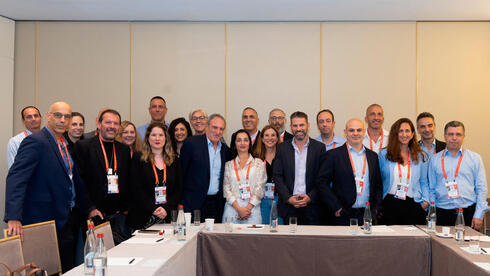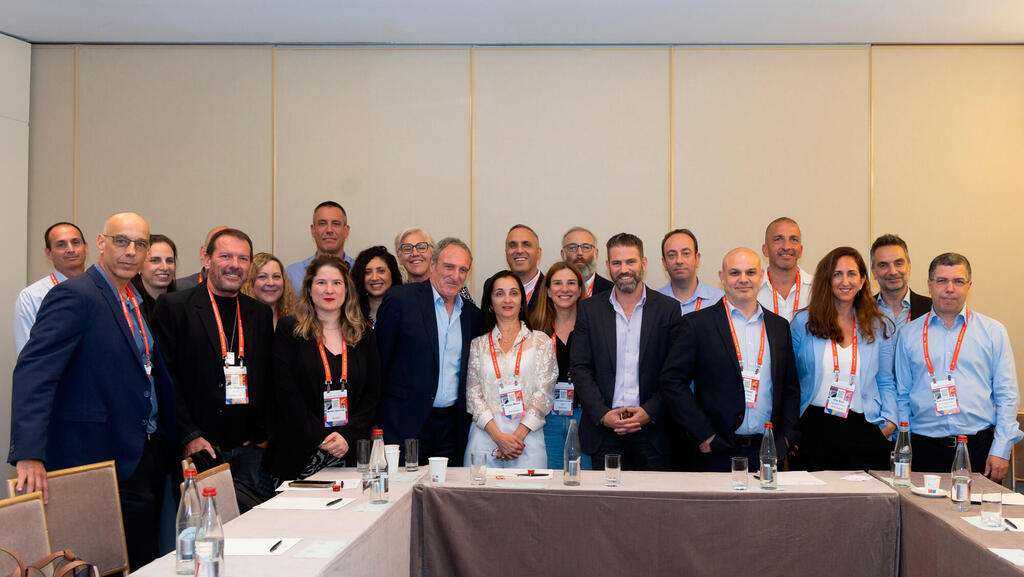
Paris 2024
"The main question for every startup is does it know how to leverage AI technology"
At a round table on the AI revolution, held as part of the business delegation to Paris, Erez Shachar, Managing Partner at Qumra Capital, estimated: "The medical field will be the fastest beneficiary of the adoption of AI capabilities." Israel Country General Manager at Microsoft, Alon Haimovich: "Through AI we enable each person to achieve more, and today we do this with the help of CoPilot, which is already implemented in almost all Microsoft technology"
On the day Nvidia published another phenomenal financial report, a roundtable discussion was held in Paris as part of the Bank Hapoalim and Calcalist business delegation. The discussion was led by Alon Haimovich, Israel Country General Manager at Microsoft, and attended by senior officials from the investment industry and venture capital funds in Israel. "ChatGPT was launched at the end of 2022 and gained 100 million users within a few months. By February this year, there were already 180 million paying subscribers and 1.7 billion casual users," Haimovich said, highlighting the rapid adoption and spread of AI.
"Two weeks ago, GPT-4o was launched," Haimovich continued. "It's a functional model with unprecedented intelligence capabilities. It can communicate via text, speech, and even express emotions. GPT-4o is changing the way we work, receive services, and communicate with each other, paving the way for a whole new way of life. It's one of the first applications we see for Artificial General Intelligence. Our mission is to help and empower every person to achieve more, and today we are adding artificial intelligence to that. We are doing this with the help of our Copilot, which is already implemented in almost all Microsoft technology."
Haimovich raised the question of how this revolution affects the evaluation of companies by investment bodies. "We are definitely challenged by the great change in the world of technology and startups and are asking ourselves new questions," said Yanai Oron, a partner at Vertex Ventures. "Entrepreneurs have to offer the world something completely new. We are less interested in strong technologists and more in people who know how to move quickly with a product. The good news is that after a difficult period when entrepreneurs were in shock due to the disruption AI has brought, we are starting to see more new companies emerge. The less good news is that it is still too early to judge their quality."
Arik Kleinstein, a managing partner of the venture capital fund Glilot Capital, added: "The challenge is not only what to invest in today, but also how to reinvent existing companies. There is no field that will not be affected by this."
Erez Shachar of Qumra Capital noted, "At Qumra, which is a growth fund, we invest in mature companies and we have the privilege of avoiding the dilemmas of early-stage funds. The main question for every startup is whether it knows how to leverage the new AI technology or whether it makes them redundant. Some of the answers also depend on the entrepreneurs themselves. My gut feeling is that the medical field will be the fastest to benefit from AI capabilities."
Nimrod Cohen, a founding partner of Tel Aviv University's TAU Ventures, added that the defense industry will benefit significantly from AI's technological advances, based on what he sees from the fund's joint activities with the Shin Bet's accelerator.
Nir Dagan, managing partner at the Sky Fund, provided a private equity perspective: "We are indeed investing in the 'old economy,' but we are already seeing how AI makes it easier for companies to expand into different geographical areas. For example, today it is very easy to adapt an existing platform in tourism to a new language and a different country."
Lior Handelsman, a general partner at Grove Ventures, concluded: "Every startup should stop today and think about the core of its product. If it can be replaced with AI, it has a problem."
The second topic discussed at the roundtable was the ethical and regulatory risks involved in the growing use of AI. Fiona Darmon, managing partner at Sunvest Capital Partners, noted: "As in the autonomous vehicle industry, I hope there won't be accidents like those at Tesla, which created the debate about who is responsible. There is a huge responsibility today for companies like Microsoft who are at the forefront. You are the ones who make these tools available, but you also need to create clear boundaries."
In conclusion, Haimovich raised the issue of Israel's image in the world and how the high-tech industry can improve it. "As a member of AI for Good—an organization that led, among other things, the AI-based campaign of the Michal Sela Forum—I think it is possible to ask how AI can solve value, moral, and human problems. Technological campaigns for problem s that are important to the world, such as violence and obesity, are something that we as Israelis can lead," said Hila Rom, founding partner of RUNI Ventures at Reichman University.
"Since October 7, I have had another goal beyond raising capital for my new fund: I speak on every stage, and I see that people think we are sitting in a bunker. Meanwhile, there are mergers and acquisitions here worth more than $4 billion, which is on the scale of a European economy. High-tech is an ambassador of Israel to the world," added Darmon.
Tami Mazel Shachar, CEO of the software company Incredibuild, added: "We need to take all our abilities and wisdom and create a campaign. There is a very strong force here that needs to be united and promoted."














